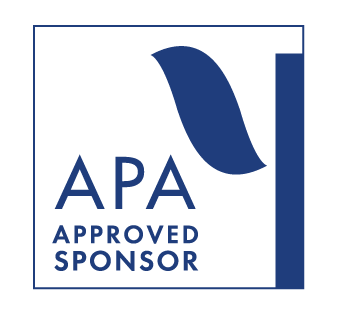December 11, 2025: Webinar “Autism Spectrum Disorder: Causes, Neurobiological Mechanisms and Controversies”
The webinar takes 3 hours and 3 CE Credits will be awarded for every live webinar by CE credit sponsor to licensed professionals.
 CUE Management Solutions, LLC is approved by the American Psychological Association to sponsor continuing education for psychologists. CUE Management Solutions, LLC maintains responsibility for this program and its content.
CUE Management Solutions, LLC is approved by the American Psychological Association to sponsor continuing education for psychologists. CUE Management Solutions, LLC maintains responsibility for this program and its content. CUE Management Solutions, LLC is recognized by the New York State Education Department’s State Board for Psychology as an approved provider of continuing education for licensed psychologists #PSY-0242.
CUE Management Solutions, LLC is recognized by the New York State Education Department’s State Board for Psychology as an approved provider of continuing education for licensed psychologists #PSY-0242.Instructor Credentials: Elkhonon Goldberg, Ph.D., ABPP., a clinical neuropsychologist and cognitive neuroscientist, and Diplomate of The American Board of Professional Psychology in Clinical Neuropsychology. His critically acclaimed and bestselling books have been translated into 24 languages.
Tuition: $185 per webinar
Format: three-hour long online webinar
Date and time:
December 11 (Thursday) from 1pm to 4pm Eastern Time (noon–3pm Central Time, 10am–1pm Pacific Time)
Training appropriate for: The course is intended for professionals concerned with mental health and with brain and brain disorders.
The course content level: Intermediate.
Autism Spectrum Disorder: Causes, Neurobiological Mechanisms and Controversies
December 11 (Thursday) from 1pm to 4pm Eastern Time (noon–3pm Central Time, 10am–1pm Pacific Time)
This 3-hour webinar provides a comprehensive overview of Autism Spectrum Disorder (ASD) with a focus on its genetic underpinnings, neurobiological mechanisms, and current controversies. Participants will gain an understanding of the highly heritable nature of ASD, including the role of rare high-impact mutations and common polygenic risk factors. The session explores critical neurobiological theories such as atypical synaptic pruning, excitation-inhibition imbalance, and microglial dysfunction, and highlights the stratification of ASD into biologically distinct subtypes using recent advances in genomics and machine learning. Environmental risk factors and regulatory guidance on debated exposures such as prenatal acetaminophen use are critically examined. The webinar bridges basic science discoveries with clinical implications, including genetic testing recommendations and the potential for targeted therapeutics. Participants will be equipped to better understand and communicate the complexities surrounding ASD causes and contemporary research findings.
Topics to be covered:
1. Genetic Foundations of Autism Spectrum Disorder (ASD): Evidence for high heritability and the contribution of rare and common genetic variants.
2. Neurobiological Mechanisms of ASD: Core pathways involving synaptic function, transcriptional regulation, and neural circuit development.
3. Atypical Synaptic Pruning: Microglial and complement-system involvement in altered pruning processes in ASD.
4. Excitation–Inhibition (E/I) Imbalance: Systems-level theories supported by genetic and neuroimaging findings.
5. Glial Cell Dysfunction in ASD: The roles of microglia and astrocytes in brain development and ASD-related changes.
6. Mitochondrial Dysfunction and Oxidative Stress: Emerging evidence in a biologically distinct subgroup of individuals with ASD.
7. Large-Scale Network Connectivity: Altered functioning of networks such as the Default Mode Network (DMN) and Salience Network (SN).
8. Environmental and Perinatal Risk Factors: Factors such as advanced parental age and maternal immune activation within the diathesis–stress framework.
9. Controversies in ASD Causation: Critical examination of myths, including vaccine claims and the debated link to prenatal acetaminophen exposure.
10. Conditions That Mimic ASD Features: Overview of other neurodevelopmental or neurological conditions that may present with autistic-like traits.
Learning objectives for training:
1. Describe the primary genetic factors contributing to ASD, including the roles of rare and common variants.
2. Explain at least two major neurobiological models of ASD, such as the excitation/inhibition imbalance hypothesis and the atypical synaptic pruning theory.
3. Analyze the evidence for and against the role of key environmental risk factors, including the controversy surrounding prenatal acetaminophen use.
4. Identify the core functions of the Default Mode and Salience networks and how their atypical connectivity relates to the clinical presentation of ASD.
Conflicts of Interest:
There is no known commercial interest or conflict of interest for this program.
Cancellation Policy:
If for any reason you need to cancel, please contact the trainer so we can work together to determine a resolution.
Dr. Elkhonon Goldberg, Ph.D., ABPP: info@lninstitute.org 800-906-5866
Grievance Policy:
We seek to ensure equitable treatment of every person and to make every attempt to resolve grievances in a fair manner. Please email us with your written grievance. Grievances would receive, to the best of our ability, corrective action in order to prevent further problems.
ADA Needs:
If you have any special requests, please email/call: Karen Newell: 707-321-0926 newell@sonic.net
CE and Commercial Support:
CUE Management Solutions, LLC does not have a relevant financial relationship(s) with ineligible companies or other potentially biasing relationships to disclose to learners.
Continuing Education
 CUE Management Solutions, LLC is approved by the American Psychological Association to sponsor continuing education for psychologists. CUE Management Solutions, LLC maintains responsibility for this program and its content.
CUE Management Solutions, LLC is approved by the American Psychological Association to sponsor continuing education for psychologists. CUE Management Solutions, LLC maintains responsibility for this program and its content. CUE Management Solutions, LLC is recognized by the New York State Education Department’s State Board for Psychology as an approved provider of continuing education for licensed psychologists #PSY-0242.
CUE Management Solutions, LLC is recognized by the New York State Education Department’s State Board for Psychology as an approved provider of continuing education for licensed psychologists #PSY-0242.






